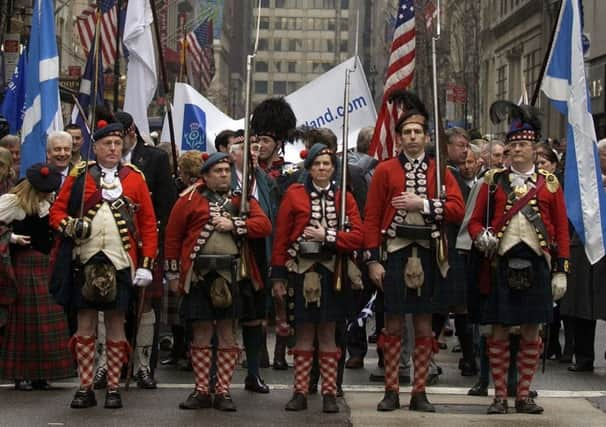Scotland Week: Tracing Scots ancestors in the United States


Around 30,000 people will gather in New York on April 6 for the centrepiece of the week, a Tartan Day parade led by Sir Billy Connolly.
Professor Marjory Harper, a historian from the University of Aberdeen, will travel stateside to take part in a number of associated events that will explore the movement of people between the two countries.
Advertisement
Hide AdAdvertisement
Hide AdProfessor Harper has spent years researching the stories of the emigrants who set sail for a new life on the other side of the world.
She has spearheaded the creation of a free online tool, The Scottish Emigration Database, which contains the records of 21,000 people who set sail from Scottish ports to cross the Atlantic
Prof Harper said: “As many of the descendants of this Scottish diaspora mark their heritage in the Scottish Week celebrations, it is timely that we consider the factors which led their ancestors to seek a new life. The database is a great starting point for this.”
She will speak at the University of New Mexico in Albuquerque on March 29 and at three events in New York and Chicago during Scottish Week.
In her public lectures she will quote extracts from more than 100 interviews with emigrant Scots that she has conducted in recent years.
Professor Harper added: “Scottish Week will be a trigger for many of those of Scottish descent to think about the reasons their forebears came to America and the journeys they took.
“The database – and the feedback we have had from it – provide insights into some of these issues. It is therefore a useful tool not only for those investigating their own family history but for anyone who is interested in understanding the wider context of the unprecedented Scottish exodus of the 1920s.
“It shows us, for instance, how post-war unemployment in the central belt led to massive disillusionment and a high departure rate, not least among shipyard workers who had been – or feared being – laid off.
Advertisement
Hide AdAdvertisement
Hide Ad“Despondency among Hebrideans that long-standing problems of land hunger had not been resolved was intensified by lingering despair in the aftermath of the Iolaire disaster.”
She said the introduction of the old age pension in 1908 meant younger people had fewer qualms about leaving elderly parents and seeking opportunities overseas.
Many in this group found their horizons had been opened up by war service, particularly those who had served alongside soldiers from the Commonwealth.
The introduction of government subsidies in 1922 also helped, as did the persuasive tactics of recruitment agents, Prof Harper said.
The database lists details of addresses, occupation and destination for passengers who embarked at Glasgow and Greenock for non-European ports between 1 January and 30 April 1923, and at other Scottish ports between 1890 and 1960.
It also gives information about specific vessels and the shipping lines to which they belonged.
Prof Harper said that she and her colleague, Dr Nick Evans, had focused initially on 1923 as the year saw a record number of 89,000 people emigrate from Scotland.
Most of this group came from the Central Belt but 595 passengers left the Hebrides in a single week on two ships, the Marloch from Lochboisdale and the Metagama from Stornoway.
Advertisement
Hide AdAdvertisement
Hide AdProfessor Harper will participate in a panel discussion on Scottish migration to America at the Carnegie Hall, New York, on April 2.
She will speak at the Chicago Scots Scottish-American History Forum on April 4 and at the New York Genealogical and Biographical Society on April 5.
